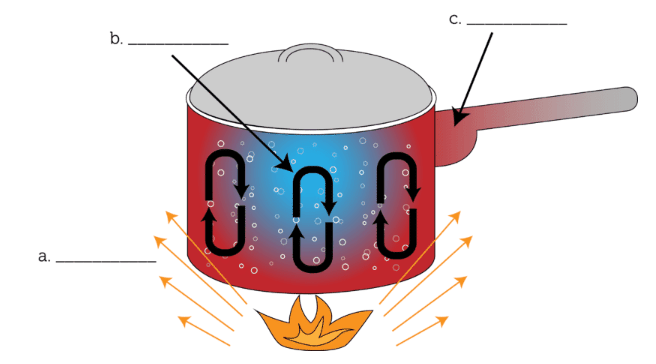Which type of heat transfer happens when you burn your hand on the stove?
What is conduction?
Material through which heat flows easily?
What are conductors
Which type of heat transfer happens when you get a sunburn during a baseball game?
Radiation
Boiling water is what type of heat transfer?
Convection
Transfer of thermal energy between materials by direct collision of particles.
Conduction
What happens to most materials when heated up?
They expand.
Radiation is...
heat transfer through electromagnetic waves
Which air is more dense? hot or cold?
Cold air is more dense.
You are supposed to get low toward the floor if you are ever caught in a building or house fire. The hotter air and smoke will rise and the cooler air will sink. What type of heat transfer does this represent?
What is Convection?
What are two examples of controlled variables for your thermos project?
Objects that do not transfer heat easily?
Insulators
What is a measure of the total value of the kinetic energy of a substance?
Thermal energy
The Three ways thermal energy is transferred are...
What is Radiation, Conduction, Convection
Heat flows from
warmer to cooler temperature
Heat rising and cooling to form currents in a fluid
What is convection?
Fill in the blanks

a) Radiation
b) Convection
c) Conduction
How much heat is absorbed by 20g granite boulder as energy from the sun causes its temperature to change from 10°C to 29°C? (Specific heat capacity of granite is 0.1 cal/gºC)
38 calories
Where in a room would you want to place hot air vents? Why is that?
Why does concrete usually get poured in slabs with spaces between each slab?
The space prevents the concrete from buckling when it expands in the summer and contracts in the winter.
What is the vocabulary word that means "the amount of heat needed to raise the temperature of a substance 1 J/kg degrees C?"
Specific heat
Do ice cubes cool down the water? or does the water warm them up? Explain.
The ice cubes are warmed up by the water because heat only transfers from hot to cold.
If two objects are at the same temperature but have different masses, will they contain the same amount of thermal energy?
NO!